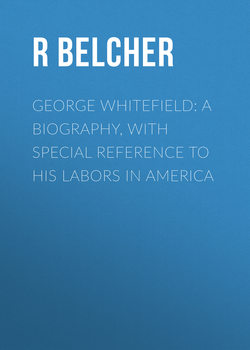Читать книгу George Whitefield: A Biography, with special reference to his labors in America - R Belcher - Страница 6
CHAPTER V.
CONTINUATION OF WHITEFIELD'S SECOND VISIT TO AMERICA.
1740
ОглавлениеAt the period when Whitefield laid the cornerstone of his Bethesda, his health was much impaired, and his spirits depressed. But it was necessary that funds should be obtained, to meet the claims now daily made upon him. He had received handsome donations from Charleston, New York, and Philadelphia, yet the urgent demand was for more. He therefore embarked from Charleston for Newcastle, Delaware, in a sloop, and arrived there in about ten days. Passing on from thence to Philadelphia, he found the churches closed against him. The commissary told him that he would lend the church to him no more. The laconic answer of Whitefield was, "The fields are open;" and eight thousand people assembled to hear him the same evening, and ten thousand on the following day. On the following Lord's day morning, he collected one hundred and ten pounds sterling for his "poor orphans," and then went to the Episcopal church, where the commissary preached a sermon on justification by works. As Whitefield was recognized at church, it was naturally expected that in the evening he would answer the sermon; nor was the public expectation disappointed. After his sermon, he collected eighty pounds more for Bethesda.
But far higher success than this attended his labors. Societies for worship were commenced in different parts of the town; not a few began seriously to inquire after the way of salvation; many negroes came to the evangelist with the inquiry, "Have I a soul?" and a church was formed, of which the distinguished Gilbert Tennent was the eminently useful pastor. No less than one hundred and forty, who had undergone a previous strict examination as to their personal piety, were received as constituent members of the church, and large additions were from time to time made to their number.
Several events of special interest occurred during this visit to Philadelphia. Tennent had to tell a series of delightful facts as to the usefulness of Whitefield's former labors. He began to deliberate on a plan for a negro school in Pennsylvania, as he did afterwards also in Virginia, but unexpected difficulties intervened, and both in the end were abandoned. Mr. Jones, the Baptist minister of the city, told Whitefield of the change produced by his former preaching on the minds of two ministers; one of whom stated to his congregation that he had hitherto been deceiving both himself and them, and added, that he could not preach to them at present, but requested them to unite in prayer with him; and the other resigned his charge, to itinerate among the unenlightened villages of New Jersey and elsewhere. Another fact was, that an Indian trader became so impressed with the preaching of Whitefield, that he had given up his business, and was gone to teach the Indians with whom he used to trade. Nor had his usefulness stopped here: he heard of a drinking club, which had attached to it a negro boy remarkable for his powers of mimicry. This boy was directed by the gentlemen who composed the club to exercise his powers on Mr. Whitefield: he did so, but very reluctantly; at length he stood up and said, "I speak the truth in Christ, I lie not; unless you repent, you will all be damned." This unexpected speech had such an effect as to break up the club, which met no more.
We add a few paragraphs from Seward's journal, who soon after sailed for England to promote the interests of Georgia, and who died in the parent country. They date from the 24th to the 26th of April. "Came to Christopher Wigner's plantation in Skippack, where many Dutch people are settled, and where the famous Mr. Spalemburg lately resided. It was surprising to see such a multitude of people gathered together in such a wilderness country, thirty miles distant from Philadelphia. Mr. Whitefield was exceedingly carried out, in his sermon, to press poor sinners to come to Christ by faith, and claim all their privileges; namely, not only righteousness and peace, but joy in the Holy Ghost; and after he had done, our dear friend Peter Bohler preached in Dutch, to those who could not understand Mr. Whitefield in English."
